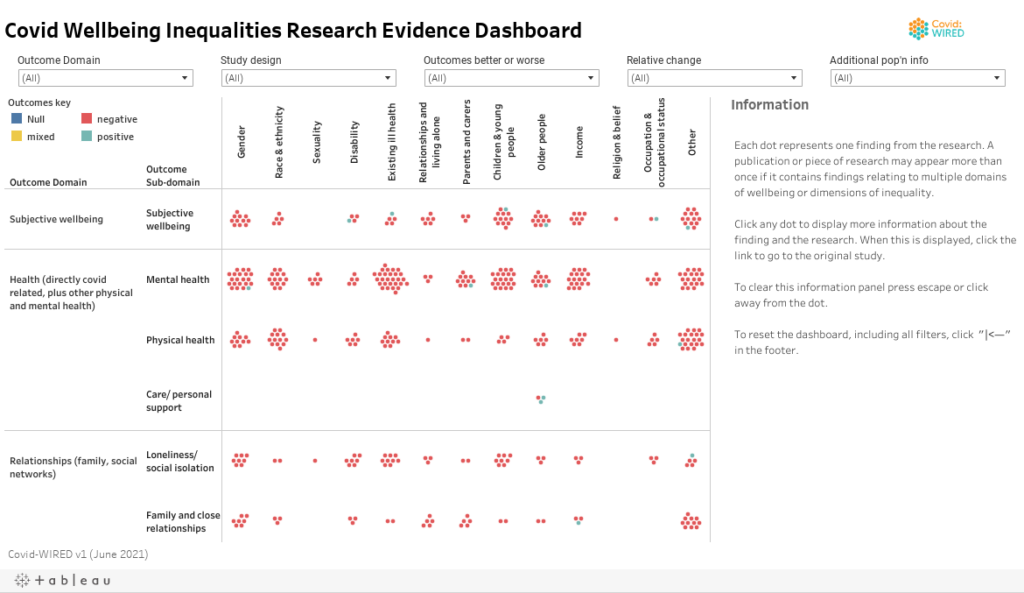Covid:WIRED – Mapping the evidence on the unequal wellbeing impacts of the pandemic
Wellbeing is ‘how we’re doing as individuals, communities and as a nation and how sustainable that is for the future’ and includes everything that matters to us as individuals, communities and society in general. And so much of our lives has been turned upside down in the past 18 months.
Our wellbeing has been affected by some of the more tangible direct impacts of the pandemic, such as income or employment losses, and illness, but also the more intangible social and psychological impacts such as loneliness, anxiety and loss of sense of purpose. At the same time we also saw an amazing response of collective resilience.
If wellbeing is the goal of society, to inform our policies and be the basis for making everyday decisions on how to spend our time and money, it is necessary to understand the full breadth of what drives our wellbeing, and how these drivers interact with each other.
This was the first goal of our latest project – Covid:WIRED – The Covid Wellbeing Inequalities Research Evidence Dashboard* – a new and unique online dashboard looking at emerging research on the impact of the pandemic on different populations and on different outcomes starting with subjective wellbeing and its six drivers:
- Health
- What we do
- Relationships
- Money
- Where we live
- Education
Covid:WIRED is a database of studies that identifies what aspects of life have been affected by the pandemic, as well as which individuals have been most impacted by these changes.
The result is a collection of over 400 pieces of evidence that have been organised with wellbeing domains on the vertical axis and dimension of inequality along the horizontal axis. You can search by domain, inequality dimension, or filter the results by study design and whether the evidence suggests the wellbeing change was positive or negative, or widened or narrowed existing wellbeing inequalities.

Image of the Covid:WIRED dashboard interface.
Unequal impacts
By looking at inequalities in the change in wellbeing, we can identify which societal groups have been hardest hit.
The second aim of this project was to look for evidence that specifically examined where impacts had been uneven in order to identify the individuals and groups that had been disproportionately affected across single or multiple wellbeing domains.
In some cases the unequal impacts from the pandemic have exacerbated existing inequalities in our society, in other cases, new gaps and vulnerabilities have been exposed.
Inequalities rose between some groups but fell between others, highlighting the importance of taking a detailed and disaggregated look at how people are doing in the UK and what is driving changes in subjective wellbeing.
Humans are resilient – some of these changes will return to normal without much of an impact, but some won’t and can have longer term effects on people’s lives.
This evidence can be used to inform the design of policies and programming to take into account how some people may have been affected by multiple drivers of wellbeing all at once and how existing inequalities and vulnerabilities may have been exacerbated, requiring a doubling down on addressing inequality in the UK.
Living resource
A wellbeing approach to effective policy and decision making is about how decisions are made. Instead of prescribed recommended one-size-fits-all policies we know that agency and control, both by individuals and communities, matters.
Covid:WIRED is unique in that it is a live database that we intend to update with new research as it is collected. Our aim is that this will be an ongoing and valuable resource for policy and practitioner audiences who are interested in understanding the unequal impact of Covid on different people’s wellbeing in a wide range of contexts.
*Developed by Deborah Hardoon, Ingrid Abreu-Scherer, Rosie Maguire, Saamah Abdallah, Sam Wren-Lewis, Liz Zeidler, Lisa Muller, Melissa Cairns, Joanne Smithson and Nancy Hey – in partnership with Centre for Thriving Places.
Use Covid:WIRED
Build your own briefing for your context
